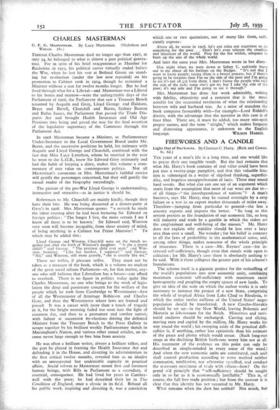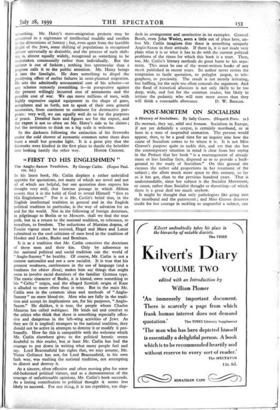FIREWORKS AND A CANDLE
TEN years of a man's life is a long time, and one would like to praise their one tangible result. But the fact remains that what Mr. Hatry's book contains of real value could have been put into a twenty-page pamphlet, and that this valuable frac- tion is submerged in a welter of slipshod thinking, superfici- ality, and hopeless misapprehension of facts. These may sound hard words. But what else can one say of an argument which starts from the assumption that most of our woes are due to— of all things—" the interdependence of nations "? A man's business, says Mr. Hatry, may be ruined overnight by a crop failure or a war in an export market thousands of miles away. Therefore—jumping from particular to general—the less a country exports and imports the better. "So long as this system persists as the foundation of our economic life, so long will industry and trade be a gamble in which the stakes are the employment and well-being of the masses." Mr. Hatry does not explain why stability should be less over a large area than over a small. No wonder ; for his belief is contrary to all the laws of probability in the mathematical sense, and, among other things, makes nonsense of the whole principle of insurance. There is a case—Mr. Keynes' case—for in- creased self-sufficiency, though even that stands wide open to criticism ; for Mr. Hatry's case there is absolutely nothing to be said. With it there collapses the greater part of his scheme's foundations.
The scheme itself is a gigantic project for the reshuffling of the world's populations into new economic units, combining maximum economic self-sufficiency with maximum racial homogeneity and peopling the empty spaces of new lands. To give an idea of the scale on which the author works it is only necessary to instance the project of a new State, comprising the whole of tropical Africa from Lake Chad to Rhodesia, to which the entire twelve millions of the United States' negro population should be transferred. A new Czecho-Slovakia should be set up—in the New World, leaving Bohemia and Moravia as lebensraum for the Reich. Minorities and terri- torial enclaves should be exchanged. Carving and slicing, moving men and capital by the million, Mr. Hatry works his way round the world ; his sweeping aside of the practical diffi- culties is, if anything, rather less optimistic than his estimate of the peace and plenty which would ensue. (Such long-run snags as the declining British birth-rate worry him not at all. His treatment of the evidence on this point can only be described as simple-minded in every sense of the word.) And when the new economic units are constituted, each unit shall control production according to some method neither communist, totalitarian, nor otherwise specified, and conduct the necessary minimum of trade with others—how? On the grand ed principle that "self-sufficiency should be sought only in so far as it is economically justifiable." This is, of course, the full free trade position ; but from the context it is clear that this identity has not occurred to Mr. Hatry.
What remains when the dust has settled? Not much, but
something. Mr. Harry's mass-emigration projects may be conceived in a nightmare of intellectual muddle and swollen to the dimensions of_fantasy ; but, even apart from the horrible plight of the Jews, some shifting of populations is recognised almost universally as desirable, and the process of such shift- ing is, almost equally widely, recognised as something to be undertaken communally rather than individually. But the subject is out of fashion ; nothing less spectacular than a pogrom calls it to the public attention. Mr. Harry brings it irtto the limelight. He does something to dispel the paralysing effect of earlier failures in semi-planned migration. He sets the admittedly astronomical cost of his scheme—or any scheme remotely resembling it—in perspective against the present willingly incurred cost of armaments and the possible cost of war. We can move millions of men, with highly expensive capital equipment in the shape of guns, aeroplanes and so forth, not to speak of their own general necessities, from continent to continent for destructive pur- poses: very well, we can equally well do so for the purposes of peace. Detailed facts and figures are for the expert, and the expert is not so often on Mr. Hatry's side as he claims ; but the invitation to think on a big scale is welcome.
In the darkness following the extinction of his fireworks under the cold shower of economic common sense there does burn a small but genuine light. It is a great pity that the fireworks were kindled in the first place to dazzle the beholder into looking hastily the other way. HONOR CROOME.









































 Previous page
Previous page